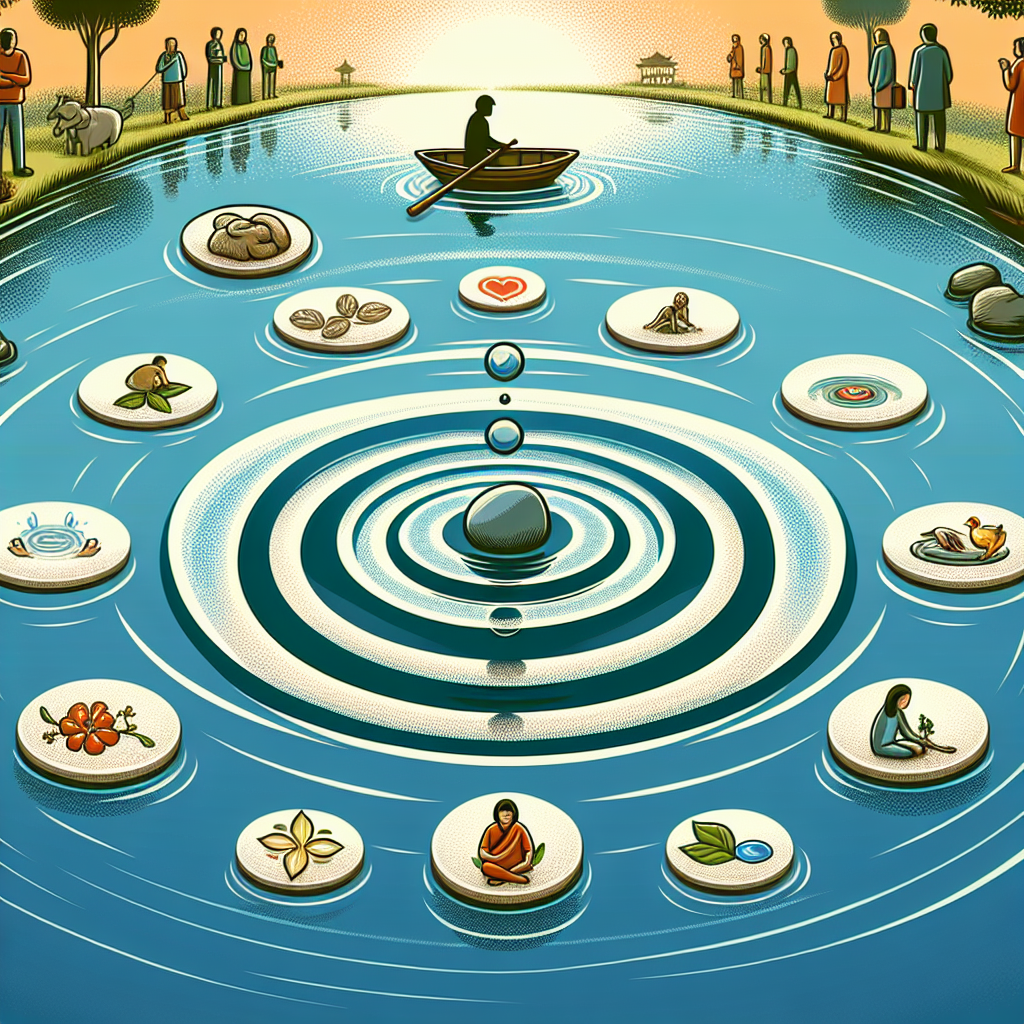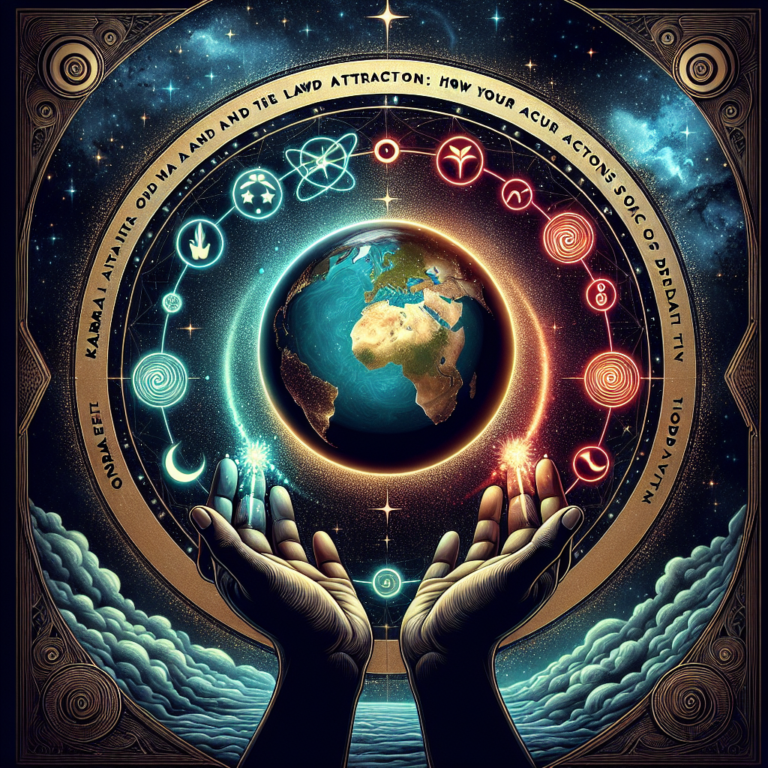Karma is an ancient concept that transcends cultures and religions. Originating from Hinduism and Buddhism, the term "karma" literally means "action" or "deed" and suggests that every action has consequences. This notion establishes a moral compass that helps individuals navigate their lives, emphasizing personal responsibility and the interconnectedness of human actions. This article delves into the ripple effect of karma, exploring how our choices shape not only our lives but also the broader world around us.
Understanding Karma
Karma is often misconstrued as a simple reward-punishment system. However, it encompasses a far richer tapestry of cause and effect. Every action—whether thought, word, or deed—creates an energy ripple that reverberates through our lives and influences the lives of others. This principle is foundational in understanding personal agency and the impact of our choices.
The Three Types of Karma
Sanchita Karma: This refers to the accumulated actions from previous lives. It encompasses all past deeds that influence our current circumstances, sometimes referred to as “destiny” or “fate.” Each individual’s unique life situation results from a complex web of past actions, both in this life and those preceding it.
Prarabdha Karma: This type of karma pertains to actions that have been set into motion and are currently manifesting in one’s life. Essentially, prarabdha karma is the portion of sanchita karma that affects our present experience, shaping our relationships, career, and life events.
- Agami Karma: This form describes the actions we take in the present that will lead to future consequences. It emphasizes the importance of our current decisions, reminding us that we are always at a crossroads, capable of influencing our future through conscious choices.
The Ripple Effect
Imagine throwing a stone into a pond. The impact creates ripples that extend outward, gradually growing weaker but reaching further with each passing moment. Similarly, our actions—whether grand or insignificant—have consequences that extend beyond our immediate understanding.
Personal Impact
At the individual level, positive actions—such as kindness, empathy, and integrity—create favorable karmic ripples that lead to personal fulfillment and enhance relationships. Conversely, negative actions such as deceit or aggression can create a cycle of negativity, leading to regret, distress, or isolation. We often find that the energy we emit returns to us, often manifested in ways we might not anticipate.
For example, helping a stranger in need may not only lead to immediate gratitude but can inspire them to help others, thus creating a chain of positivity. Over time, we may find that our consistent positive actions attract similar experiences and people into our lives, reinforcing our well-being and sense of community.
Social Impact
Karma doesn’t just influence individual lives; it also shapes the fabric of society. Collective actions, either positive or negative, create shared karma that can uplift or harm communities. Acts of kindness can lead to a culture of support and cohesion, while widespread injustice can cause a ripple of suffering.
Consider the impact of community service. When individuals come together to uplift those in need—be it through volunteering, donating, or advocating for change—it fosters an environment of compassion. This collective action not only benefits those being helped but also cultivates a sense of purpose within the volunteers, contributing to personal growth and community development.
How Karma Influences Choices
Understanding karma encourages conscious decision-making. Recognizing that our choices have far-reaching implications prompts us to consider the potential outcomes of our actions more carefully.
Mindful Living: Being aware of the ripple effect of our choices allows us to live more mindfully. When faced with a decision, considering how different choices might impact others can lead to more compassionate outcomes. This awareness can transform simple daily interactions into powerful opportunities for positive change.
Growth and Learning: Embracing the lessons woven into our karmic results fosters personal growth. Rather than viewing setbacks or mistakes as failures, individuals can choose to see them as opportunities for learning and improvement. Each experience helps to refine our future actions and choices.
- Building Relationships: When we engage in positive ethical behavior, we create healthier relationships. Understanding karma cultivates empathy and encourages us to support one another, reinforcing bonds that contribute to a positive social ecosystem.
The Role of Intention
While actions are crucial in establishing karma, the intent behind those actions holds equal importance. Deeds performed with genuine kindness and love are more likely to generate positive karma than those executed out of obligation or for self-gain. Thus, having a clear intention infused with good values acts as a guiding principle in our actions.
Conclusion
Karma is not merely a philosophical or spiritual concept; it is a practical understanding of how our actions resonate throughout our lives and into the lives of others. Embracing the ripple effect of karma encourages us to live with intention, fostering a cycle of positivity and growth both personally and collectively.
By making conscious choices, we can become sources of positive change in our communities and the world. Ultimately, understanding karma highlights our interconnectedness, promoting a culture of empathy, responsibility, and love.
FAQs
1. What is the origin of the concept of karma?
Karma originates from ancient Indian philosophies, particularly Hinduism and Buddhism, where it is viewed as a fundamental principle governing moral and ethical decisions.
2. Does karma only apply to actions, or can it also apply to thoughts and intentions?
Karma encompasses actions, thoughts, and intentions. The energy generated by each of these can create ripples, impacting ourselves and others.
3. Can karma change over time?
Yes, karma is dynamic. While past actions shape our current experiences, new actions (agami karma) can alter future outcomes, allowing for personal growth and change.
4. Is karma immediate, or does it take time to manifest?
Karma can manifest immediately or may take considerable time to unfold. Some actions may yield immediate feedback, while others may take years or even lifetimes to come to fruition.
5. How can I cultivate positive karma in my life?
To cultivate positive karma, engage in acts of kindness, be mindful of your intentions, treat others with respect and empathy, and learn from past mistakes to make better choices in the present.
Embracing the ripple effect of karma allows us to navigate our lives with deeper awareness and intention, ultimately leading to a more harmonious existence.
It seems like you’ve entered “Prompt” without additional context. Could you please provide more details or specify what type of prompt you are looking for? For instance, are you looking for a writing prompt, a question to discuss, a creative idea, or something else? Let me know how I can assist you!, #Ripple #Effect #Karma #Shapes #Lives #Choices, #Ripple #Effect #Karma #Shapes #Lives #Choices, 1736730342, the-ripple-effect-how-karma-shapes-our-lives-and-choices





